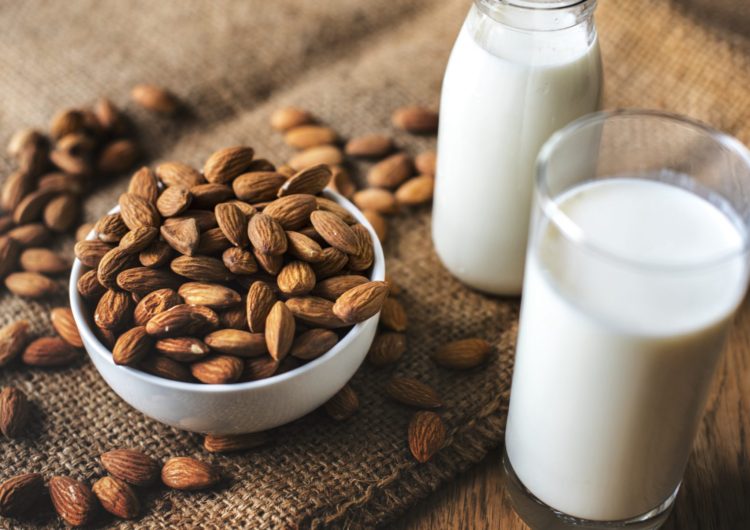Baking can be challenging if you are a vegan.
No dairy and no egg – two major ingredients when it comes to baking sweet stuff. But do not be daunted as I have rounded up some easy substitutions that are in most kitchens.
The dairy part of the equation is pretty simple. You can try substituting butter with vegetable oil or coconut oil, often with fairly satisfying results. Dairy-free margarine also works in many bakes.
Baking is a science and a lot of it is a matter of trial and error, but when it comes to finding out what does and doesn’t work, thats all part of the fun! Do some research to find what suits your recipe if you are adapting one.
Egg replacement options usually work in recipes that require up to 3 eggs – anything over that and you will end up with a bit of a sloppy mess.
Egg Substitutions
For vegan chefs and bakers, replacing eggs is probably the biggest challenge of all. It’s tricky to get that right combination of texture and volume while also finding something that will behave in a similar way when it interacts with the other ingredients. When it comes down to it, there are no perfect vegan substitutions for eggs, but here is list of the most common ones. You need to chose which will work with the recipe you are using.
Applesauce
Applesauce is a purée made from cooked apples.
Using one-fourth cup (about 65 grams) of applesauce can replace one egg in most recipes.
It’s best to use unsweetened applesauce. If you’re using a sweetened variety, you should reduce the amount of sugar or sweetener in the recipe itself.

Mashed Banana
Mashed banana is another popular replacement for eggs.
The only downside to baking with bananas is that your finished product may have a mild banana flavor.
Other puréed fruits like pumpkin and avocado work too and may not affect the flavor as much.
Whichever fruit you choose to use, you can replace each egg with one-fourth cup (65 grams) of purée
This substitution works best in cakes, muffins, brownies and quick breads.

Ground Flax seeds or Chia Seeds
Flax seeds and Chia seeds are both tiny seeds that are highly nutritious.
You can grind the seeds yourself at home or buy ready-made seed meal from the store.
To replace one egg, whisk together 1 tablespoon (7 grams) of ground chia or flaxseeds with 3 tablespoons (45 grams) of water until fully absorbed and thickened.
It works best in products like pancakes, waffles, muffins, breads and cookies.

Commercial Egg Replacer
There are a variety of commercial egg replacers on the market. These are typically made from potato starch, tapioca starch and leavening agents.
Egg replacers are suitable for all baked goods and should not affect the flavor of the finished product.
Silken Tofu
Tofu is condensed soya milk that has been processed and pressed into solid blocks.
The texture of tofu varies based on its water content. The more water that is pressed out, the firmer the tofu gets.
Silken tofu has a high water content and is, therefore, softer in consistency.
To replace one egg, substitute one-fourth cup (about 60 grams) of puréed, silken tofu.
Silken tofu is relatively flavorless, but it can make baked goods dense and heavy, so it’s best used in brownies, cookies, quick breads and cakes.

Vinegar and Baking Soda
Mixing 1 teaspoon (7 grams) of baking soda with 1 tablespoon (15 grams) of vinegar can replace one egg in most recipes.
Apple cider vinegar or white distilled vinegar are the most popular choices.
When mixed together, vinegar and baking soda start a chemical reaction that produces carbon dioxide and water, which makes baked goods light and airy.
This substitution works best for cakes, cupcakes and quick breads.
Yogurt
Soya yogurt is a good substitute for eggs.
It’s best to use plain soya yogurt, as flavored and sweetened varieties may alter the flavor of your recipe.
You can use one-fourth cup (60 grams) of yogurt for each egg that needs to be replaced.
This substitution works best for muffins, cakes and cupcakes.

Arrowroot Powder
Arrowroot is a South American tuber plant that is high in starch. The starch is extracted from the roots of the plant and sold as a powder, starch or flour.
It resembles corn starch and is used in cooking, baking and a variety of personal and household products. You can find it at many health food stores and online.
A mixture of 2 tablespoons (about 18 grams) of arrowroot powder and 3 tablespoons (45 grams) of water can be used to replace one egg.
Aquafaba
Aquafaba is the liquid left over from cooking beans or legumes.
It’s the same liquid that is found in canned chickpeas or beans.
The liquid has a very similar consistency to that of raw egg whites, making it an excellent substitution for many recipes.
You can use 3 tablespoons (45 grams) of aquafaba to replace one egg.
Aquafaba works especially well in recipes that call for just egg whites, such as meringues, marshmallows, macaroons or nougat.
Nut Butter
Nut butters like peanut, cashew or almond butter can also be used to substitute eggs in most recipes.
To replace one egg, use 3 tablespoons (60 grams) of nut butter.
This may affect the flavor of your finished product, and it’s best used in brownies, pancakes and cookies.
You should also make sure to use creamy nut butters, rather than chunky varieties, so that everything mixes properly.

Carbonated Water
Carbonated water can add moisture to a recipe, but it also acts as a great leavening agent.
The carbonation traps air bubbles, which help make the finished product light and fluffy.
You can replace each egg with one-fourth cup (60 grams) of carbonated water.
This substitution works great for cakes, cupcakes and quick breads.
Agar-Agar
Agar-agar is a vegan alternative obtained from a type of seaweed or algae.
Use 1 tablespoon (9 grams) of agar-agar powder mixed with 1 tablespoon (15 grams) of water to replace one egg.
Soy Lecithin
Soy lecithin is a byproduct of soybean oil and has binding properties similar to that of eggs.
It’s frequently added to commercially prepared foods because of its ability to mix and hold ingredients together.
It’s also sold in powder form in most health food stores and online.
Adding 1 tablespoon (14 grams) of soy lecithin powder to your recipe can replace one egg.
Vegetable Oil
The simple recipe for one egg is ¼ cup of vegetable oil. I mostly use this substitution when making cookies as a binding agent and for moisture. If you add more oil than above, the cookies can be oily and greasy.
 www.swansonvitamins.com
www.swansonvitamins.com
Dairy Substitutions
Now that we’ve got our eggs taken care of, what about the dairy? If you’re converting a regular recipe to the vegan version, having one of these vegan dairy substitutes is a necessity.
Vegan milk substitutes basically fall into two categories – nut milk and other plant-based milks. The best part about these substitutes, though, is that you can use them to replace the milk that’s called for in the recipe with a simple 1:1 ratio. No math necessary!
By far the most popular type of plant-based milk, almond and oat milks are loved be vegans and meat-eaters like because they just so good! There is a huge range of dairy free milks so try them all to find your own favourite, oat is mine!
Whether you use it to replace regular milk in your baked goods or pour it over your cereal, almond milk is praised as the “good kind of fat” alternative to cow’s milk.
Milk
If a recipe calls for cow’s milk, try using an equal amount of unsweetened soya milk, oat milk, almond milk or coconut milk. Pick a nondairy milk that will complement the taste of the dish, like coconut milk in tropical treats or almond milk in nuttier baked goods.

Buttermilk
Use any nondairy milk to make vegan “buttermilk”: add 1 tablespoon of lemon juice or 1 tablespoon of vinegar to 1 cup of nondairy milk.
Butter
Try swapping out butter for vegetable oil, olive oil or coconut oil. For recipes that really need that “buttery” feel, such as pie crust or icing, use a vegan margarine or vegan shortening.
Cream
Cream creates a smooth and sometimes fluffy texture in baked goods. It adds richness, and can make for a satin-like quality. The richness of coconut milk and coconut cream can make a good replacement for cream. For a homemade replacement, blend one-part cashews and one part water until smooth. There are also a variety of non-dairy creams on the market.
Yogurt
Yogurt substitutes work great in raitas and other Indian foods like biryanis which call for yogurt.
Tofu yogurt: 1 cup silken tofu blended with 2 tbsp lemon juice + 1/4 tsp salt (use more or less lemon juice if you don’t want your yogurt to be too acidic.)
Soy yogurts are available everywhere now. Look in the regular refrigerator aisle alongside regular yogurt.
Quick cashew yogurt: Make by soaking 1/2 cup raw cashews in 3/4 cup of water for at least 30 minutes, then blending to a smooth paste with juice of 1 lemon and a pinch of salt.
Honey
Honey acts as a natural sweetener. It also helps to brown your baked goods, adds color, and retains moisture. Use maple syrup, rice syrup, or agave nectar. They add the same natural sweetness and contribute to the browning effect.












